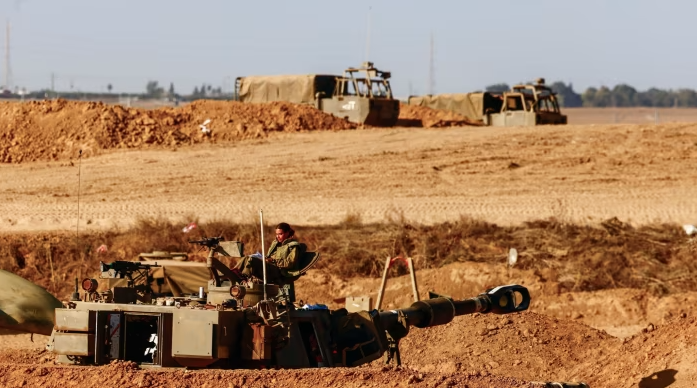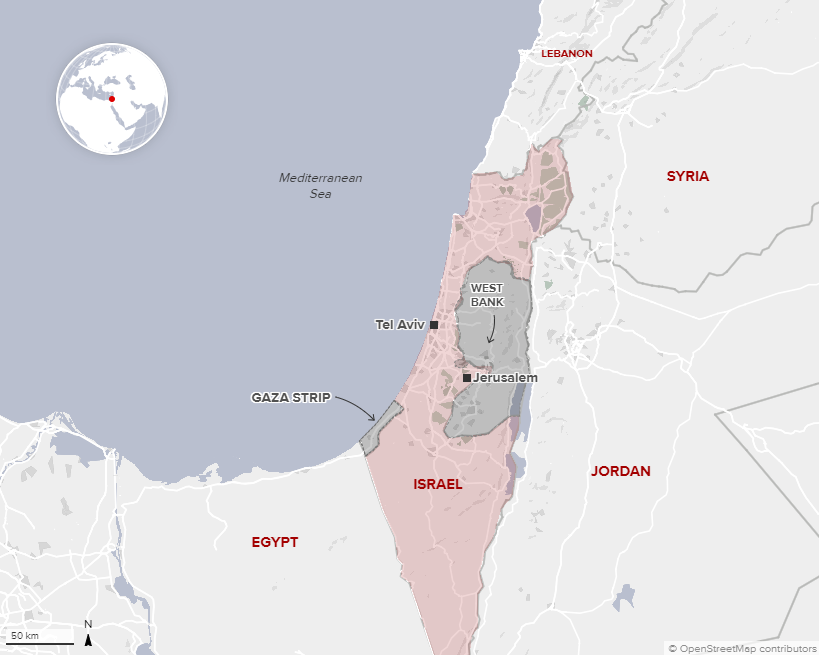Just last month, Israeli Prime Minister Benjamin Netanyahu predicted a new era of peace and prosperity in the Middle East, as his country gains growing acceptance in the region.
But that vision has been shattered since the latest wave of conflict between the Jewish state and the Palestinian Islamist movement Hamas erupted on October 7.
As the Israel-Hamas war enters its fourth week, the mobilization of 360,000 reservists and the evacuation of 250,000 Israelis from their homes, according to figures provided by the Israel Defense Forces (IDF), has brought many businesses to a standstill.
Everything is upside down
For Naama Zedakihu, who owns two restaurants in Modi'in, a town between Jerusalem and Tel Aviv, the crisis has forced her to consider temporarily laying off her 70 employees.
“I tried to open the restaurant for the first time after 2 1/2 weeks but the restaurant was empty so I had to close early,” Ms. Zedakihu said on October 24. “The sales were not enough to sustain the business.”
From small restaurants and construction sites to high-tech companies and a major gas field operated by the US corporation Chevron, to airlines cancelling most flights to Israel and tourists cancelling trips, every aspect of Israel’s economy is being shaken by the conflict.
The damage the $520 billion economy is facing is no less than that caused by the Covid-19 pandemic shutdowns, with schools, offices and construction sites across the country emptying or opening for just a few hours a day.

An Israeli soldier sits on an armored fighting vehicle at an undisclosed location near the border with the Gaza Strip, October 30, 2023. Photo: Shutterstock
Israel has called up a record 360,000 reservists ahead of its ground offensive in Gaza, depleting about 8% of its workforce.
The call-up of troops and partial economic freezes have caused a sudden drop in activity, upending everything from banking to agriculture , costing the government the equivalent of $2.5 billion a month, according to Mizrahi-Tefahot, Israel's third-largest commercial bank.
Israel declared war on Hamas after it attacked residential areas in the south of the country on October 7, killing about 1,400 people and taking more than 200 hostages. Meanwhile, the death toll from retaliatory airstrikes on the Gaza Strip, a narrow strip of land along the Mediterranean coast controlled by Hamas, has risen to 8,306, Al Jazeera reported on October 30, citing the Palestinian Health Ministry.
The financial damage has been severe. Israel's main stock index TA-35 fell 16% in dollar terms, wiping out nearly $25 billion in value.
The shekel has fallen to its weakest level since 2012 – despite the Bank of Israel announcing an unprecedented $45 billion package to defend the currency – and is heading for its worst year this century. The cost of hedging against further losses has soared.
Israel entered the war with about $200 billion in foreign exchange reserves. In addition, the Biden administration wants the U.S. Congress to approve $14 billion in emergency aid to Israel, much of it military funding, on top of the $3.8 billion the Jewish state receives annually.
The Bank of Israel (BoI) has warned that the impact will worsen as the conflict drags on. The BoI has cut its 2023 economic growth forecast for Israel from 3% to 2.3% – assuming fighting is contained in the south of the country.
Difficulties even before conflict
The geographic scope and duration of the conflict will determine its long-term economic impact. Prime Minister Netanyahu warned on October 28 of a “long and difficult” military campaign as Israel began its first ground offensive in Gaza.

Map showing the location of the Gaza Strip on the Mediterranean coast, bordering Israel and Egypt. Photo: 9News
JPMorgan Chase & Co. on Oct. 29 predicted that Israel's economy will shrink 11% in the final three months of this year compared with the same period last year.
Israel’s recent conflicts — including a 2006 clash with Lebanon-based Hezbollah and another with Hamas in 2014 that lasted about seven weeks and included a ground offensive in Gaza — “had little impact on economic activity,” JPMorgan analysts said. But “the current war has had a much larger impact on domestic security and confidence.”
Even before the war, Israel – a country with a dynamic economy that rivaled that of Western Europe – was struggling. Its coffers, once bulging with investments in technology, were overshadowed by a sweeping overhaul of its judicial system.
The government says the unelected judiciary has too much power, but supporters see it as the most serious check on politicians’ power. Domestic governance concerns, rising inflation and a global slowdown in technology investment last year also weighed on Israel’s economy.
Investment in Israeli startups, which attracted a record $27 billion in 2021, fell by nearly half last year.
Investments fell another 68% in the first half of this year, compared to the same period last year, due to investor concerns surrounding the country's judicial reforms, according to Israel's Startup Nation Policy Institute.
The Israel Innovation Authority examined startups during the war and found that a slowdown in fundraising, coupled with employees being called up for reserve duty, posed challenges for a significant number of high-tech companies.
With technology accounting for 48 percent of Israel’s exports, the sector’s prosperity is vital to the economy. Even as companies say they are adapting, the plight of many businesses suggests the crisis could leave more lasting scars on Israel’s economy .
Minh Duc (According to Bloomberg, AP)
Source































![[Photo] National Assembly Chairman attends the seminar "Building and operating an international financial center and recommendations for Vietnam"](https://vphoto.vietnam.vn/thumb/1200x675/vietnam/resource/IMAGE/2025/7/28/76393436936e457db31ec84433289f72)





































































Comment (0)